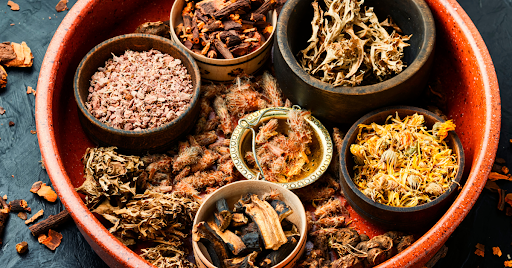
Traditional medicine, which includes a variety of practices such as herbal medicine, acupuncture, and indigenous therapies, has been widely used for centuries by 88% of all countries worldwide. Despite the growing popularity of conventional medicine, traditional medicine continues to be an integral resource for health, particularly for those with limited access to conventional healthcare. In fact, in some lower- and middle-income countries, traditional healers remain the only or main health providers for millions of people living in rural areas.
According to the World Health Organization (WHO), 65-80% of the world’s healthcare practice includes the use of traditional medicine in some way. This demonstrates the continuing demand for and popularity of alternative remedies on a global scale. Additionally, traditional medicine is an important part of the growing trillion-dollar global health, wellness, beauty, and pharmaceutical industries. More than 40% of pharmaceutical formulations are based on natural products, and landmark drugs such as aspirin and artemisinin originated from traditional medicine.
One of the most common misconceptions about traditional medicine is that it can’t coexist with modern medicine. Integrating both forms can provide a more comprehensive approach to patient care. This allows for a wider range of treatment options, which can lead to better health outcomes. For some patients, traditional medicine may be the only available form of healthcare, particularly in areas with limited access to modern medical facilities. By integrating traditional medicine into healthcare systems, patients can access a wider range of healthcare services and treatments that can help them achieve better health outcomes.
Key Benefits of Traditional Medicine
One of the key benefits of traditional medicine is its accessibility. Traditional medicine is often more affordable and accessible than conventional medicine. In some areas, traditional healers may be the only healthcare providers available, making their services essential to the well-being of the community.
What’s more, traditional medicine can be an important resource for preserving sociocultural practices and biodiversity heritages. Many traditional healing practices are deeply rooted in cultural traditions and are an important part of the cultural heritage of communities around the world. Preserving these practices can help to promote inclusivity, diversity, and sustainable development.
Furthermore, traditional medicine’s focus is on holistic healing. Traditional medicine practitioners often take a more holistic approach to health, considering not only physical symptoms but also the patient’s emotional, spiritual, and social well-being. This can lead to more comprehensive and personalized treatment plans that address the root causes of illness and promote overall wellness.
Holistic Care is the Future
One of the leading holistic treatment providers is Evinature, an Israel-based startup that’s at the forefront of cutting-edge research in integrative therapies for IBD. The company sources, develops, and distributes clinically-proven nutraceuticals that provide patients around the world with access to accurate diagnosis and treatment through its proprietary online platform.

The Evinature platform guides patients through the CurQD™ Protocol, which is a natural and tailored treatment regimen based on the research of the company’s founders, Professor Shomron Ben-Horin and Nir Salomon. The CurQD™ Protocol has been successfully integrated into standard clinical practice in leading medical centers in Israel and has transformed the way IBD patients are treated.
Evinature believes that there’s no one-size-fits-all when it comes to treatment. Their team collects and analyzes patients’ assessments to provide them with all the necessary information to start and maintain their individualized care. The input from all patients is compiled and compared, allowing for the tailoring of personalized recovery plans with the utmost accuracy, and keeping patients informed about their condition and the latest research updates.
By combining the best of both worlds, the intersection between traditional and modern medicine serves as the remedy for inefficient global healthcare access. Ultimately, it’s about seeking a treatment that works for one’s health history, overall condition, and lifestyle.
You may be interested in: Medicine of the Future: Top Healthcare Technology Innovations to Watch For

